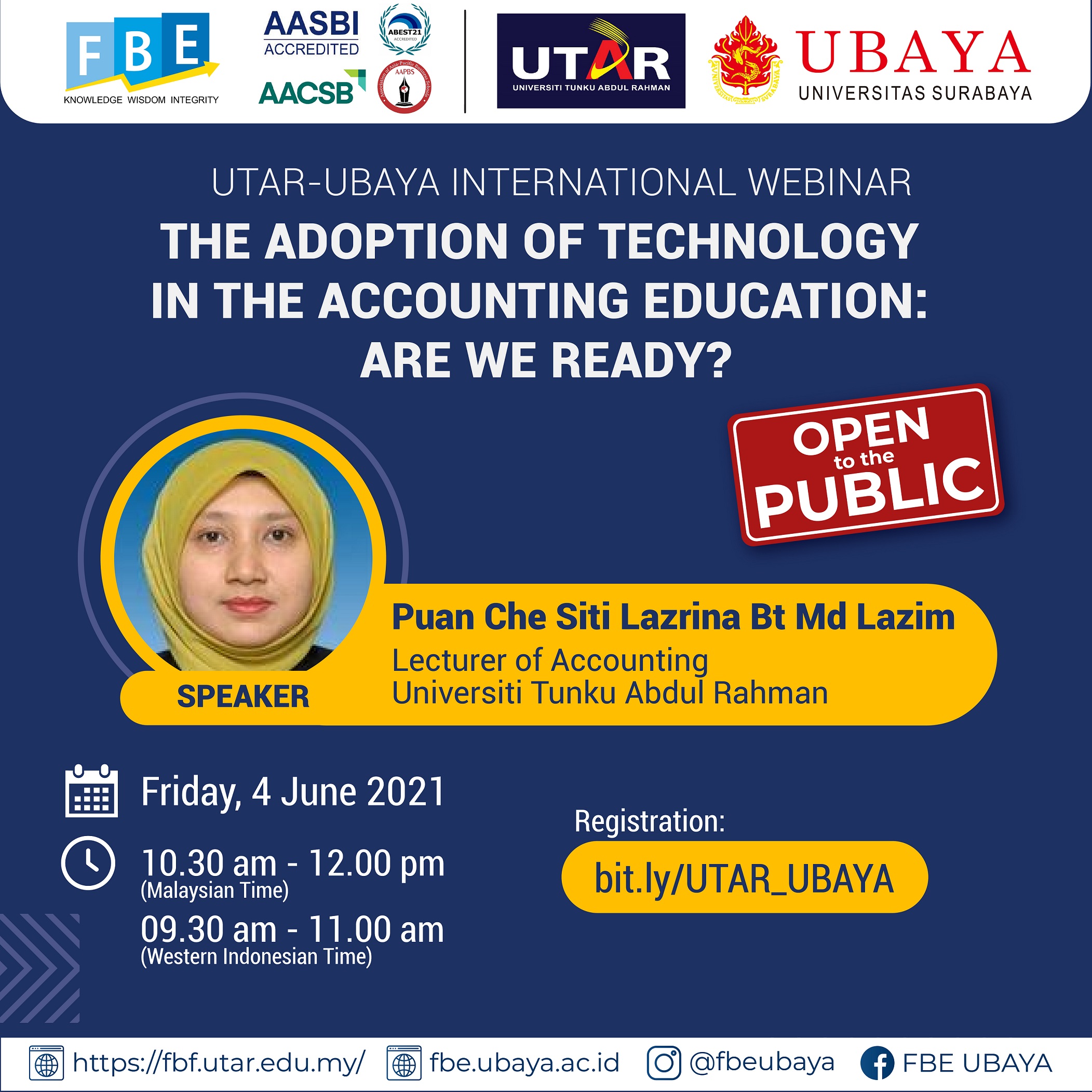

The second UTAR-UBAYA International Webinar
Invited to deliver the webinar was FBF Department of Commerce and
Accountancy lecturer Che Siti Lazrina binti Md Lazim. Also present at the
webinar were CABF
Chairperson-cum-FBF
Department of Finance lecturer Dr Nurul
Afidah binti Mohamad Yusof, lecturers and students from UTAR and UBAYA.

Che Siti
Lazrina delivering her talk titled “The Adoption of Technology in The
Accounting Education: Are We Ready?”
Che Siti Lazrina began her talk by highlighting the emerging technology
skills needed in the accounting profession to remain relevant. In preparing
the profession for the fourth industrial revolution, the Malaysian Institute
of Accountants (MIA) has developed the MIA Digital Technology Blueprint 2018
to guide accountants in developing action plans for technology enhancement.

Che Siti Lazrina presenting the skills needed in
the accounting profession
Then,
Che Siti Lazrina shared the incidences
of two institutions that successfully adapted to the pandemic.
She said, “The Covid-19 pandemic has forced educational
institutions to quickly develop online learning methods. There were two
institutions that
successfully adapted to the pandemic. They were Zhejiang University and
the Imperial College London. The Zhejiang University had offered more than
5,000 courses online in a period of just two weeks, while the Imperial
College London
offered highly popular courses on coronavirus. I believe that their success
was possible due to the online learning which allows students and lecturers
from different locations to interact with each other through online
platform.”
In her recently published paper titled “Application of technology acceptance
model (TAM) towards online learning during the Covid-19 pandemic: Accounting
students perspective”,
Che Siti Lazrina indicated that although online learning
has become an attractive learning tool, it has also brought some issues
affecting technology acceptance among the students. The Technology
Acceptance Model (TAM) was used in the study to investigate the factors
influencing students’ acceptance of online learning in higher education
institutions.
She explained, “The components in TAM include the perceived ease of use,
perceived usefulness and attitude influenced intention for learning during
the lockdowns. For perceived usefulness, it was found that some students
were less confident on online learning methods due to limited internet
access and speed.”
She added, “Student’s acceptance behaviour towards online learning was
influenced by attitude between perceived ease of use and perceived
usefulness. The relationship validates the model’s base sequence where
perceived ease of use and usefulness influence attitude.”

Che Siti Lazrina presenting her research data on the barriers of technology
adoption
Che Siti Lazrina concluded her talk by
highlighting the sudden implementation of online learning which could lead
the government, regulators and practitioners to enhance the learning process
as well as improving online education.
“The feedback from students and lecturers is important as it could help to
further develop online education amidst the environment where learning
methods have been drastically altered due to the Covid-19 outbreak
worldwide,”
Che Siti Lazrina said.
The talk ended after the Q&A session. The participants expressed their
gratitude to
Che Siti Lazrina
for sharing her insights and findings.
Wholly owned by UTAR Education Foundation (200201010564(578227-M)) LEGAL STATEMENT TERM OF USAGE PRIVACY NOTICE